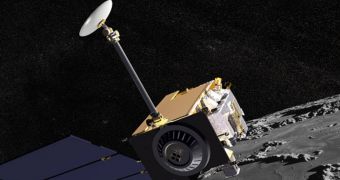The Lunar Reconnaissance Orbiter (LRO) probe, launched from the Cape Canaveral Air Force Station in Florida on June 18th, has only recently successfully entered the Moon's orbit. While the event marks the beginning of NASA's return to the natural satellite, which will culminate in 2020 with a proposed manned mission, the instruments aboard the spacecraft have a purpose that is more close to the present day. They are to map the lunar surface in as much detail as possible.
The main goal of LRO is to scout for areas on the Moon that are suitable for a manned mission landing, and to mark them on the maps. Additionally, it has to construct the maps themselves. Its instruments are responsible for creating the most complex set of lunar maps ever made. As a secondary objective, the probe needs to scout the surface of Earth's satellite for signs of potential resources, which could be used if humans decide to construct a basic settlement on the Moon.
Among the craft's instruments, mission engineers installed Diviner, which is essentially a nine-channel radiometer. Designed, built and managed by the NASA Jet Propulsion Laboratory, in Pasadena, California, the LRO component's main mission is to generate the most accurate temperature map of the Moon, and especially of its polar regions. When its mission is complete, Diviner will have supplied NASA with the most comprehensive view of lunar temperature variations.
Additionally, the tool will also have to generate a map of exactly how many mountains the Moon has, how they are spread, and how high they are. The composition of Earth's natural satellite will also be investigated by the instrument, which is more formally known as the Diviner Lunar Radiometer Experiment (DLRE). It will have to measure lunar surface thermal emissions, which could prove essential for the American space agency in devising its future manned missions.
The LRO mission as a whole is managed out of the NASA Goddard Space Flight Center, in Greenbelt, Maryland, while Diviner's principal investigator, David Paige, is based at the University of California in Los Angeles (UCLA). The Institute for Space Research, in Moscow, the Russian Federation, is also involved in supporting the Lunar Reconnaissance Orbiter mission.

 14 DAY TRIAL //
14 DAY TRIAL //